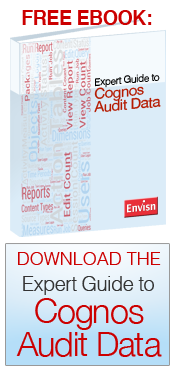By Rick Ryan - Envisn, Inc.  With the release of version 10.1.1 IBM Cognos announced the ability to archive Cognos content. Up to this point the only option has been to retain content in the Cognos Content Store if it was still needed.
With the release of version 10.1.1 IBM Cognos announced the ability to archive Cognos content. Up to this point the only option has been to retain content in the Cognos Content Store if it was still needed.
Finally Here
Cognos administrators have long wanted the ability to archive Cognos content based on retention rules such as date, content type, etc. And just to be clear, here we’re talking about what is generally referred to as “saved output”, that is, the actual results of reports run at a given time or for periods in the past. In many large Cognos environments it’s not uncommon to see the physical size of saved output greatly exceed that of packages, reports, queries and the rest of the objects in the Cognos Content Store. And since there are statutory requirements for retaining reports for specified periods, this is a real need.
IBM Cognos recommends archiving saved output since it can enhance both scalability and performance on your BI servers. And based on what some of our large customers have experienced, this is a real issue.
How to Archive Cognos Content
Archiving allows administrators to archive saved report output for specific packages and folders after installing or upgrading to the latest version of IBM Cognos BI. You only need to do this step once since all of your content is currently located in your Content Store. The three steps to get this operational are:
- Within Cognos BI create a data source connection to the external repository.
- In Cognos Connection, select repository connections for the packages and folders that need to be archived. Note: Since you may not need to archive all folders some thought should be given to this subject before implementing archiving.
- Create and run a content archival maintenance task to select the folders and packages to archive in the repository. This step actually moves the content.
Once this is set up any new report output is automatically archived which means there is no need to run the content archival maintenance task again. Unless what you need to archive changes or you need to add additional packages and reports to be archived, it’s basically a “set it and forget it” proposition.
Implementing archiving obviously implies that the content not selected for archiving is available for deletion from the Content Store. Unless you do this you’re just holding onto content you don’t need. And since there is no way for you to easily know now much saved output you actually have in your Cognos Content Store, using a product like NetVisn you can easily determine the spaced used by location, package, owner and object type of any content.
One of the nice features of this capability is that you can view the archived content directly from within Cognos Connection. This can be useful if, for example, you needed to compare the results from a report run two years ago with a current report. The older report could be in a totally different repository but can be viewed as if it’s with the current report. You also have the option to view the archived content in the archive repository directly.
The archiving capability also enables you to set rules for how many versions of a report should be retained and to also preserve the content IDs before you archive, if necessary. At the current time the only repository supported is IBM FileNet.
We actually got a hint about two years ago that this would be coming. In a technical review of our products with IBM Cognos we were asked if we planned to address this issue. We replied that it was on our radar screen but not yet one of our development priorities and were then told by Cognos that they were planning to do something in this area. We then decided not to focus any development in this area.
More information on archiving Cognos content can be found at:
and here:
|
If any of you have actually implemented this new feature then please share your experience with us and others by posting a comment to this blog or send us an email at info@envisn.com. We would like to learn about your experience with this new feature within Cognos. |
© 2012 - Envisn, Inc. - Tools for Managing Cognos BI – All rights reserved.
Image by Andy Castro




